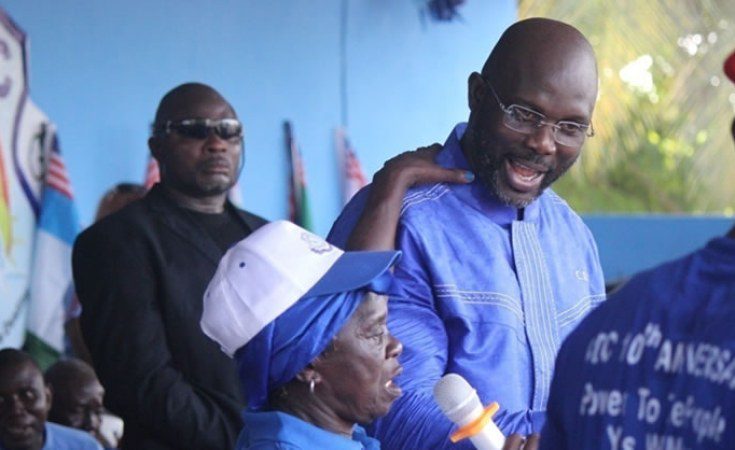Liberians in 2017 elected former football world beater George Manneh Weah as president demonstrating the love that his people had for him..
‘Oppong’, as he is popularly known, won the highest votes in 14 of the 15 political subdivisions of the country, a clear indication of his popularity.
Weah’s Congress for Democratic Change party (CDC) merged with war crimes convict Charles Taylor’s National Patriotic Party and former House Speaker Alex Tyler’s.
Their campaign promise was ‘Change for Hope’.
However, two years into his six-year term, that hope has not been met according to most Liberians given the unprecedented economic hardship witnessed in the country today.
The exchange rate of the Liberian dollar to the United States dollar has skyrocketed to an unprecedented proportion, sparking a hike in the prices of basic commodities, transportation fares, school fees and other costs of living.
In the midst of the high cost of living, government has demonstrated inability to fund health and other government-run institutions.
Health facilities across the country are slowing down their operations due to lack of drugs, fuel to run generators and other essential health materials.
This has resulted to an increase in the death rate from sicknesses across the country.
Security and other government agencies, commissions and ministries are also highlighting their inability to operate fully due to lack of adequate budgetary support.
Of late, the government has been faced with the challenge of paying the salaries of civil servants and other government employees.
Some agencies have complained of not being paid for up to six months, while civil servants have gone three months without pay.
This has prompted the resignation of some heads of government agencies, and strike actions and protests by aggrieved workers. One protest that has claimed the attention of Liberians is the recent protest by health workers.
For a week health workers across the country abandoned health facilities in demand of three months salary arrears.
The recent strike action by health workers also prompted a strike by pregnant women in demand of the payment of health workers’ salary arrears so that they can return to work to cater to the sick.
The worsening economic situation in the country has sparked a debate about the ability of the Coalition for Democratic Change government headed by former soccer star George Weah to effectively govern the post-war country.
Radio talk shows are inundated with criticisms of the Weah-led government’s inability to effectively govern the country.
“Liberians made a mistake to elect a footballer as president. He and his appointees lack the ability to govern this country. All they are concerned about is to enrich themselves,” a prominent Talk Show Host Henry Costa said.
Many callers on radio stations have questioned how the Liberian leader acquired the funding to construct 47 four-storey buildings in less than a year after his ascension to the presidency.
Many people argue that the Liberian leader who depended on the support of partisans and friends to fund his election campaign, did not have the funding before his ascension to the presidency to construct that number of houses.
About a year into his presidency, civil society advocates launched a protest code-named: ‘Bring Back Our Money’ for the recovery of an estimated 16 billion Liberian dollars which went missing and could not be accounted for by the government.
The missing money saga was flagged by a local journalist noted for his investigative potential. It was after the report by the journalist that the government arrested and indicted six current and former officials of the Central Bank of Liberia who were reportedly involved in the printing of the money and
an excess of 2.8 billion Liberian dollars.
Also, shortly after assuming state power, the government of President Weah launched a mop-up exercise with 25 million United States dollars to address the issue of the high exchange rate of the Liberian dollar against the United States dollar.
However, despite the mop up exercise, the rate of the United States dollar against the Liberian dollar has continued to skyrocket.
Following public pressure, an investigation which was launched discovered that of the US$25 million, only US$17 million was used for the mop up exercise.
However, even the $17 million did not make the required impact on the exchange rate.
The harsh economic situation in the country has created untold hardship for citizens and residents of the country.
Most families can hardly afford a meal a day, while many parents cannot afford to pay their children’s school fees.
This has also sparked a spate of protests and threats of protests.
The latest threat is by the Council of Patriots (COP), a grouping of opposition political parties.
According to a Spokesman of the COP, they will stage a protest beginning December 30 this year to compel President George Manneh Weah to relinquish state power.
“Weah lacks the know-how and capability to run this country, and must therefore resign so that the living standards of Liberians will improve” the spokesman said.
In his recent speech at the 74 General Assembly of the United Nations General Assembly in New York, President Weah told the world body that “Liberia is beginning to witness the emergence of a creeping threat to its democratic space, and hard-won peace and stability.
According to him, some individuals in the country who have lost democratically-held elections have resorted to incitement, threats of violence, misuse of social media, and hate speech, with the aim and objective of achieving power through undemocratic means.
“This is unacceptable, and must not be encouraged by those who wish Liberia well”.
For democracy to thrive, all Liberians, including both the ruling party and the opposition parties, must respect the rule of law, and abide by the procedures and regulations prescribed by law.
TSS/abj/APA


